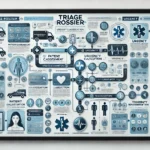Carepoi triage is a critical process in healthcare that ensures patients requiring immediate attention receive the appropriate care. This process is particularly important during times of increased pressure, such as natural disasters or pandemics. At Carepoi, the triage system is designed to quickly assess patient needs and prioritize care, ensuring that the most vulnerable patients receive the assistance they need without delay. In this article, we will explore the significance of triage, the mechanisms used, its application in telemedicine, and how the Carepoi triage system integrates these principles to improve patient outcomes.
Understanding Triage
The term “triage” comes from the French word “trier,” meaning “to sort.” This process involves assessing patient needs and prioritizing their care. The primary goal of triage is to ensure that the most severe and urgent conditions are addressed first, thereby enhancing survival chances.
Key Elements of Triage
- Emergency Cases: During triage, patients are evaluated based on the severity of their symptoms, prioritizing those with life-threatening conditions.
- Reducing Mortality: Proper implementation of triage can significantly lower mortality rates, especially in emergency environments.
Mechanisms of Triage
Triage can be executed through various methods, including:
- Clinical Assessment: Patients are examined by medical personnel to determine their health status.
- Technology Integration: Telemedicine systems, like Carepoi, incorporate triage procedures that utilize artificial intelligence algorithms for automated symptom evaluation.
Carepoi Triage Process
Self-Diagnosis
Carepoi Triage Process begins with patient self-diagnosis. Users can input their symptoms through a user-friendly interface, which includes:
- Intuitive Interface: Designed with user experience in mind, Carepoi allows patients to easily enter their symptoms, minimizing the need for advanced technical knowledge.
- Symptom Questionnaires: The system may include questionnaires that guide users in detailing their symptoms, facilitating accurate assessments.
Data Analysis of Carepoi Triage
Once users have entered their symptoms, the process moves to data analysis. Carepoi’s AI algorithms process the submitted information and provide recommendations for the next steps in care.
- Personalized Recommendations: The algorithms analyze data to suggest appropriate next actions, including self-care guidance, lifestyle changes, or recommendations for consultations with healthcare professionals.
- Statistical Insights: The analysis may also leverage data from previous users to identify common symptom patterns, thus offering more accurate suggestions.
Connectivity with Healthcare Professionals
The final phase of the triage process at Carepoi involves connecting patients with healthcare providers. If further care is needed, patients can easily schedule appointments with medical professionals through the platform.
- Easy Access to Doctors: The platform enables virtual consultations, allowing patients to receive care without needing to visit clinics in person.
- General Support: Even if users do not require immediate medical attention, they can receive guidance on managing their symptoms or monitoring their condition.
Benefits Carepoi Triage
Speed and Accuracy
Carepoi’s triage process offers significant benefits in terms of speed and accuracy in delivering healthcare services.
- Rapid Assessment: Users receive immediate and personalized advice, reducing the time required to access appropriate care.
- Accurate Guidance: The use of AI algorithms ensures that recommendations are data-driven, enhancing the likelihood of accurate diagnoses.
- User Convenience: Patients can access healthcare services without the need to travel to clinics or hospitals.
- Improved Patient Experience: The streamlined triage process alleviates anxiety and disruption for patients, promoting a better overall experience.
Telemedicine: The Future of Healthcare
Telemedicine has rapidly evolved in recent years, with the COVID-19 pandemic accelerating its adoption. Patients can now consult doctors from the comfort of their homes through video calls. The integration of triage into telemedicine significantly enhances the patient experience, as assessment procedures become more efficient.
Advantages of Telemedicine
- Accessibility: Patients gain access to healthcare services, even in remote areas.
- Time Savings: Visiting a doctor becomes quicker and more straightforward.
- Reduced Transmission Risks: Fewer patients in the same physical space lower the chances of infection spread.
Conclusion
Triage is not just a critical process in healthcare; it is the backbone of effective patient management, directly contributing to improved health outcomes. Carepoi stands at the forefront of this evolution, seamlessly integrating triage into telemedicine to enhance access to quality healthcare services for all patients.
By leveraging innovative technologies and AI-driven solutions, Carepoi ensures that patients receive prompt, accurate assessments and recommendations, significantly reducing the barriers to care. While challenges remain in the healthcare landscape, Carepoi’s commitment to advancing triage processes is set to revolutionize healthcare delivery, making it more efficient, accessible, and patient-centered.
The proper implementation of triage through platforms like Carepoi will play an increasingly crucial role in managing healthcare effectively, ensuring that every patient receives the timely attention and care they deserve.
Gain a deeper understanding of the protocols used in emergency triage by exploring the Rossier Protocol: A Key Tool for Emergency Triage. This protocol is essential for ensuring rapid, effective patient assessment during critical situations, further highlighting the importance of structured triage systems in healthcare.



